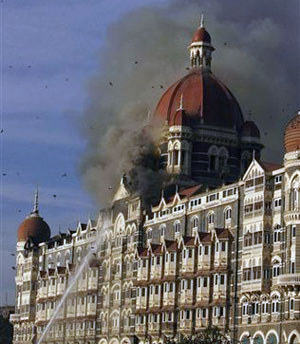US asks Pakistan to prosecute Mumbai terror suspects
 Kolkata, Oct 14 : The United States Wednesday asked Pakistan to prosecute "successfully" the seven 26/11 Mumbai terror attack suspects and marshal facts and evidence to punish Hafiz Saeed who, India says, masterminded the carnage.
Kolkata, Oct 14 : The United States Wednesday asked Pakistan to prosecute "successfully" the seven 26/11 Mumbai terror attack suspects and marshal facts and evidence to punish Hafiz Saeed who, India says, masterminded the carnage.
"It is very important that Pakistan prosecute successfully the seven Mumbai suspects and take facts and evidence about Hafiz Saeed and prosecute him," US Ambassador to India Timothy J. Roemer told mediapersons here.
Citing a bureaucratic lapse, the Lahore High Court Monday dismissed two cases filed under the anti-terrorism act against Saeed.
The envoy said Pakistan should also dismantle the terror infrastructure set up by the Lashkar-e-Taiba on its soil.
Rounding up his maiden two-day visit to the city, during which he met West Bengal Chief Minister Buddhadeb Bhattacharjee, Roemer repeated US Defense Secretary Robert Gates' description of the Pak-Afghan border as the epicentre of "radical extremism".
The ambassador said the US was working closely with India and in "unprecedented ways" to share information, intelligence and on improving "the trust that was established when the FBI came to India to testify about the Mumbai attacks".
"We share the common concern that India felt on Nov 26 last year as we felt on 9/11 when our country was attacked".
Referring to Home Minister P. Chidambaram's recent visit to US, where he requested "unprecedented cooperation" from Washington on containing terrorism, Roemer said his country was ready to share information on forensic labs, DNA and biometrics.
He said apart from India, there were only a few countries with which US had such a strategic relationship on sharing information.
"There is a shared agreement about the threat of extreme radicalism that comes from places like Pakistan," he said.
He said the US and India have now launched a new strategic dialogue that would increase the scope and pace of the cooperation between the two nations.
The five key pillars of the dialogue were "strategic cooperation; science, technology, health and innovation; energy and climate change; education and development; and finally, economics, trade and agriculture".
"These reflect the full range of our relationship, which is no longer focused on a single issue, but is as expansive as the needs and interests of our two people," he said.
The India-US relationship, he said, was built on the success of "what has been done in the past" by the two governments, and the leading political parties on both sides.
"But most importantly, it's a relationship that is people to people. The relationship has a great destiny going forward. And it is going (forward) in a very optimistic and positive way".
Describing trust as a very important part of the India-US relationship, he said: "It is built upon the shared strategic interest and the geo-political concerns that both the countries have."(IANS)